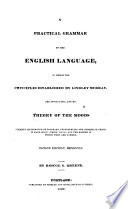 | Lindley Murray - English language - 1805 - 348 pages
...confused appearance, it has been discontinued. It is, however, very proper to begin with a capital, 1. The first word of every book, chapter, letter note, or any other piece of writing. 2. The first word after a period; and, if the two seatences are totally independent, after... | |
 | Lindley Murray - English language - 1809 - 330 pages
...confused appearance, it has been discontinued. It is, however, very proper to begin with a capital. 1. The first word of every book, chapter, letter, note, or any other piece of writing, 2. The first word after a period ; and, if the two sentences are totally indcpendenf, after... | |
 | Lindley Murray - English language - 1818 - 158 pages
...removed. DIRECTIONS IESPECTING THE USE OF CAPITAL LETTERS. It is proper to begin with a capital. 1. The first word of every book, chapter, letter, note, or any other piece of writing 2. The first word after a period ; and if the two sections are totally independent, after... | |
 | William Nicholson - Natural history - 1819 - 412 pages
...not more absurd than that of using no capitals at all. Capitals, however, may very properly commence the first word of every book, chapter, letter, note, or any other piece of writing: the first word after a period, and if the two sentences are totally independent, after... | |
 | William Nicholson - Natural history - 1819 - 414 pages
...not more absurd than that of using no capitals at all. Capitals, however, may very properly commence the first word of every book, chapter, letter, note, or any other piece of writing: the first word after a period, and if the two sentences are totally independent, after... | |
 | Allen Fisk - English language - 1822 - 192 pages
...appearance, it has been discontinued. It is, however, very proper to begin with a capital, . ' 1 . The first word of every book, chapter, letter, note, or any other piece of writing. JW) But 1f a number of interrogative or exclamatory sentences are thrown into one general... | |
 | Roscoe Goddard Greene - English language - 1830 - 124 pages
...chapters, &c.. as, " .Johnson's Dictionary of the English Language ; Rollin's Ancient History." 2. The first word of every book, chapter, letter, note, or any other piece of writing. 3. The beginning of the first word after a period ; and if the two sentences are totally... | |
 | J. M. Putnam - English language - 1831 - 186 pages
...confused ap; earance, it has been discontinued. It is, however, very proper to begin with a capital, 1. The first word of every book, chapter, letter, note, or any other piece of writing. 2. The first woid after a |,eriod; and, if the two sentences are loyally independent, a.ter... | |
 | Roswell Chamberlain Smith - English language - 1834 - 202 pages
...omitted. Directions respecting the Use of CAPITAL LETTERS. It isproper to begin with a capital, 1. The first word of every book, chapter, letter, note,- or any other piece of writing. 2. The first word after a period, and, if the two sentences are totally independent, after... | |
 | Richard Hiley - 1834 - 188 pages
...writing and in printing; but at present, only the following words begin with capital letters:— 1. The first word of every book, chapter, letter, note, or any other piece of writing. 2. The first word after a period; also after a note of interrogation or exclamation, when... | |
| |